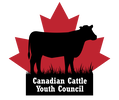|
In March, I had the opportunity to attend to the Canadian Cattlemen’s Association’s (CCA) Animal Health and Care Committee annual meeting virtually on March 17, 2021. There were many topics discussed and I will highlight some of them that I think would be interesting to young producers.
First was the ongoing discussion of a vaccine bank in case of a foot and mount disease outbreak. At this point in time Canada does not have enough vaccines in the event of an emergency situation. CCA is strongly encouraging the government for a vaccine bank. An Ultra High Frequency tag trial at the Picture Butte Feeder Cooperation started in 2020. It is a trial put on by the feeder association for use in feedlots in a commercial environment. It will be expanded to five other locations in 2021 as well. There was also discussion from a trial participant and he was very positive about it so far. There’s a new rest stop facility near Kapiskasing ONT, called the Feed and Water Cow Mootel. This rest stop has been in operation since fall 2020 and currently has the capacity for 3-4 semi-trailers of feeder cattle, with ability to expand if demand is there. There was an update on Transport Canada’s changes to the Commercial Vehicle Drivers Hours of Service Regulations. These regulations come into effect in June 2021 and will mandate the use of Electronic Logging Devices for commercial livestock haulers. CCA has heard concerns from livestock truckers on these new regulations and have expressed these concerns to Transport Canada. Animal Health Emergency Management (AHEM) has developed producer handbooks and provincial association plans. AHEM is working closely with CCA to develop a National Emergency Response Framework. A working draft of the beef framework has been developed and next steps include a comprehensive test to help identify where gaps in the plan remain along with confirming strengths of the plan. The National Farm Animal Care Council continues to be active on a number of files including updating the Codes of Practice. Transportation is the focus with the recently released Humane Transportation Regulations. The CCA is also please to see that Canada is one step closer to attaining BSE negligible risk status. During the Animal Health and Care Committee meeting, CFIA National Coordinator BSE Program, Aman Bath, updated the committee on Canada’s BSE negligible risk application to the World Organisation for Animal Health (OIE). CFIA received notification earlier in March that Canada has received a recommendation by the OIE’s Scientific Commission to grant Canada the negligible status for BSE risk. The recommendation will then be put to a vote by the delegates at the 88th General Assembly at the end of May. Negligible risk status would help facilitate expanded access to foreign markets for various beef products currently limited by BSE era restrictions.
0 Comments
The Canadian Cattlemen’s Association’s (CCA) Food Policy Committee has been very busy since the last report. The Committee has dealt with food labeling issues, building CCA's position on simulated meat products and the Canadian Food Inspection Agency (CFIA) consultation on simulated meat labeling guidelines.
At the start of December, the CFIA closed its consultation on simulated meat and poultry labeling guidelines. With the guidance of the Food Policy Committee, CCA’s Lauren Martin outlined a response to the proposed guidelines. The general context of CCA's submission was to maintain the position that no simulated meat products should ever have the chance to be mistaken for a traditional meat product. Thus, the submission outlined that our position was that simulated meat products should not be allowed to use terms such as sirloin, striploin or ribeye as these are traditional meat terms and have a high likelihood of confusing the consumer. Other points the submission outlined were not allowing companies to use images of animals of the meat they are trying to simulate. The misleading labeling of alternative proteins has been a concern of the Food Policy Committee because it may have the opportunity to mislead consumers in-store. Thus, CCA staff reviews the trademark office to see if any plant protein product's trademarks would have misleading names/descriptions that could be confused as a traditional beef product. The Food Policy Committee is currently building a strategy on how to deal with any infringements on the regulations. This has been an active file as of lately for the committee and will continue to be into the year ahead. During the Food Policy Committee meeting on March 15, 2021 held during the CCA virtual AGM, the committee was briefed on the current status of the Front of Pack labeling on ground beef which could impact ground beef sales as the warning labels for saturated fat may steer consumers away from it. Currently, this regulation has been pushed back on implementation due to the COVID-19 pandemic and may be implemented this upcoming fall; however, there has not been a firm timeline established. To rebut these claims, Canada Beef has outlined a strategy to promote the importance of ground beef and the nutrients it provides to humans. Also, they are looking to build a name for ground beef since it is more of a generic product, and they feel that it will better be served with a story and a brand behind it. Lastly, the Food Policy Committee was involved with a UN Food System Summit virtual independent dialogue at the end of April hosted by the CCA and the Nature Conservancy of Canada. Insight and feedback gathered from the sessions will be analyzed and formally provided to the United Nations with more work to come to ensure CCA is part of building sustainability goals. This is important to be involved in as it is the first summit in 25 years. The Food Policy Committee continues to address any issues as they see fit. |
Search by typing & pressing enter



 RSS Feed
RSS Feed
